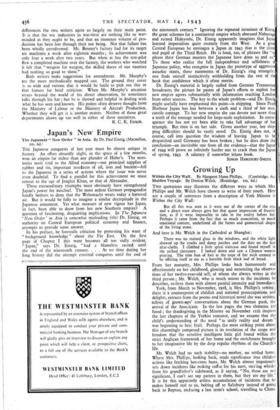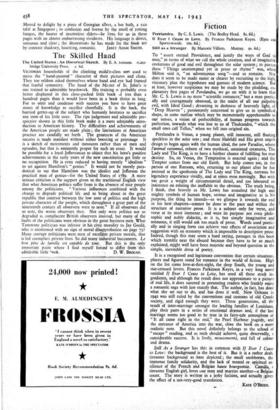Growing Up
Within the City Wall. By Margaret Mann Phillips. (Cambridge. 6s.) Maiden Voyage. By Denton Welch. (Routledge. tos. 6d.)
Two quotations may illustrate the different ways in which Mrs. Phillips and Mr. Welch have chosen to write of their youth. Here are a couple of sentences from a description of York Minster in Within the City Wall:
But all this was seen as it were out of the corner of the eye, and a direct stare always gave her that queer impression of frustra- tion, as if it were impossible to take in the reality before her. Perhaps it came from the fact that so much association, so much emotional content, underlined all the forms and geometriCal shapes of the living stone.
And here is Mr. Welch in the Cathedral at Shanghai: There was no stained glass in the windows, and the white light showed up the cracks and damp patches and the dust on the lace altar-cloths. I climbed a little spiral staircase and found myself in the arched clerestory. I looked down and saw a Chinese woman praying. The trim bun of hair at the nape of her neck seemed to be offering itself to me as a horrible little black loaf of bread.
From her maturity, Mrs. Phillips looks back humorously and affectionately on her childhood, glossing and annotating the observa- tions of her twelve-year-old self, of whom she always writes in the third person ; Mr. Welch, who is much nearer to the incidents he describes, re-lives them with almost painful intensity and immediacy.
York, from March to November, 1918, is Mrs. Phillips's setting ; there is a counterpoint of childish and national preoccupations and delights, extracts from the poems and historical novel she was writing, echoes of grown-ups' conversations about the German push, the arrival of the Americans. In the last pages the two elements are fused ; the thanksgiving in the Minster on November 11th inspires the last chapters of the Yorkist romance, and we assume that the child's understanding of the need " to unify reality and dream " was beginning to bear fruit. Perhaps the most striking point about this charmingly composed picture is its revelation of the scope and freedom that the sensitive intelligent little girl found within the strict Anglican framework of her home and the enrichment brought to her imaginative life by the deep regular rhythms of the Church's life.
Mr. Welch had no such stability—no mother, no settled home. Where Mrs. Phillips, looking back, reads significance into childish actions like fetching hot-cross buns, Mr. Welch almost impatiently sets down incidents like making coffee for his aunt, stea'ing whisky from his grandfather's sideboard, as if saying, "No, these are not significant, I can't see any pattern in them, but they are my life." It is by this apparently artless accumulation of incidents that he makes himself real to us, bolting off to Salisbury instead of going back to Repton, enduring a last term's school, travelling to China. Moved to delight by a piece of Georgian silver, a hot bath, a rice tafel at Singapore ; to confusion and horror by the smell of rotting fungus, the banter of insensitive elders—he lives for us in these pages with an almost embarrassing vividness. His language is direct, sensuous and clear ; the decorations he has made for the book are
by contrast shadowy, haunting, romantic. JANET ADAM SMITH.



























 Previous page
Previous page